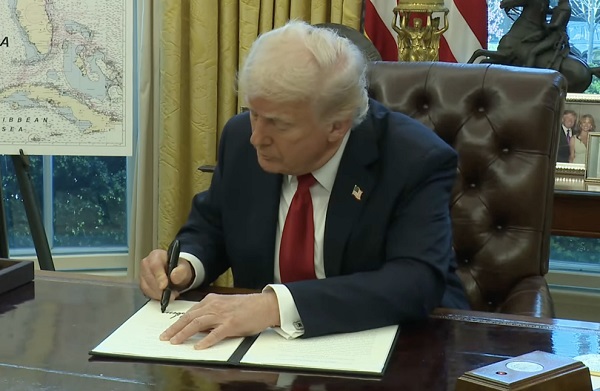From The Center Square
Among the executive orders President Donald Trump signed Thursday was one instructing federal banking regulators to shed language from their guidance documents that the administration believes can lead to the debanking of people or institutions for political reasons.
“It is the policy of the United States that no American should be denied access to financial services because of their constitutionally or statutorily protected beliefs, affiliations, or political views, and to ensure that politicised or unlawful debanking is not used as a tool to inhibit such beliefs, affiliations, or political views,” the order reads.
Debanking individuals or institutions on the basis of political and personal views has become more visible in the U.S. since 2020, following similar reported trends in the U.K. and Europe where organizations like BankTrack and Bankwatch have monitored and reported on banks’ clients’ compliance with certain climate and human rights initiatives for decades.
Debanking occurs when a financial institution either closes or restricts an account or refuses to provide services to a potential client. Perhaps the most well-known, large-scale example occurred in 2022, when the Canadian government seized and froze the bank accounts of some participating in the Freedom Convoy, a convoy of thousands of truckers across Canada protesting the country’s vaccine mandates.
Financial institutions can and have also debanked clients independently of government involvement or direction. The order, however, focuses on federal reforms to prevent the government from encouraging or inciting debanking, as it claims it did in Operation Choke Point. The operation, which took place under the Obama administration, designated certain industries as high-risk for fraud and money laundering.
Republicans say the administration used it to target individuals, businesses and industries it opposed politically – like the gun industry – while Democrats say it was simply aimed at protecting consumers.
The Small Business Administration and other federal banking regulators are to “remove the use of reputation risk or equivalent concepts” from documents they use to “regulate or examine” financial institutions to avoid encouraging the debanking of clients for political or “unlawful” reasons.
The order also directs the SBA to ensure the reinstatement of clients’ accounts at financial institutions that debanked them for such reasons.
Thirty-two members of the State Financial Officers Foundation from 24 states signed onto a joint statement commending the executive order.
“President Trump’s executive action directly confronts this abuse of regulatory authority,” they said. “By reaffirming that banks must evaluate customers based on objective financial criteria, not political or religious views, his leadership marks a crucial step toward restoring viewpoint neutrality and putting an end to unlawful discrimination in our financial sector.”
Financial institutions can debank clients if those clients are found to be engaged in illegal activity.
















